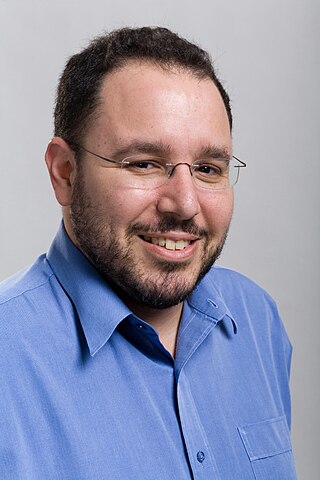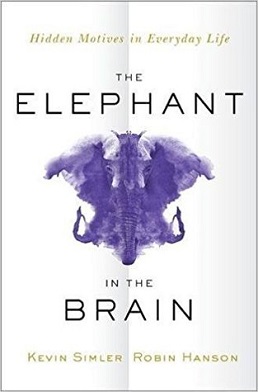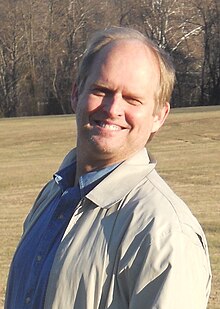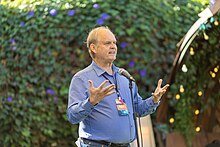
George Mason University (GMU) is a public research university in Fairfax County, Virginia in Northern Virginia near Washington, D.C.

James McGill Buchanan Jr. was an American economist known for his work on public choice theory originally outlined in his most famous work, The Calculus of Consent, co-authored with Gordon Tullock in 1962. He continued to develop the theory, eventually receiving the Nobel Memorial Prize in Economic Sciences in 1986. Buchanan's work initiated research on how politicians' and bureaucrats' self-interest, utility maximization, and other non-wealth-maximizing considerations affect their decision-making. He was a member of the Board of Advisors of The Independent Institute as well as of the Institute of Economic Affairs, a member of the Mont Pelerin Society (MPS) and MPS president from 1984 to 1986, a Distinguished Senior Fellow of the Cato Institute, and professor at George Mason University.
Behavioral economics is the study of the psychological, cognitive, emotional, cultural and social factors involved in the decisions of individuals or institutions, and how these decisions deviate from those implied by classical economic theory.
Bryan Douglas Caplan is an American economist and author. Caplan is a professor of economics at George Mason University, research fellow at the Mercatus Center, adjunct scholar at the Cato Institute, and former contributor to the Freakonomics blog and EconLog. He currently publishes his own blog, Bet on It. Caplan is a self-described "economic libertarian". The bulk of Caplan's academic work is in behavioral economics and public economics, especially public choice theory.
The Policy Analysis Market (PAM), part of the FutureMAP project, was a proposed futures exchange developed, beginning in May 2001, by the Information Awareness Office (IAO) of the United States Defense Advanced Research Projects Agency (DARPA), and based on an idea first proposed by Net Exchange, a San Diego, California, research firm specializing in the development of online prediction markets. PAM was shut down in August 2003 after multiple US senators condemned it as an assassination and terrorism market, a characterization criticized in turn by futures-exchange expert Robin Hanson of George Mason University, and several journalists. Since PAM's closure, several private-sector variations on the idea have been launched.
Prediction markets, also known as betting markets, information markets, decision markets, idea futures or event derivatives, are open markets that enable the prediction of specific outcomes using financial incentives. They are exchange-traded markets established for trading bets in the outcome of various events. The market prices can indicate what the crowd thinks the probability of the event is. A typical prediction market contract is set up to trade between 0 and 100%. The most common form of a prediction market is a binary option market, which will expire at the price of 0 or 100%. Prediction markets can be thought of as belonging to the more general concept of crowdsourcing which is specially designed to aggregate information on particular topics of interest. The main purposes of prediction markets are eliciting aggregating beliefs over an unknown future outcome. Traders with different beliefs trade on contracts whose payoffs are related to the unknown future outcome and the market prices of the contracts are considered as the aggregated belief.

Julian Lincoln Simon was an American economist. He was a professor of economics and business administration at the University of Illinois from 1963 to 1983 before later moving to the University of Maryland, where he taught for the remainder of his academic career.

Alexander Taghi Tabarrok is a Canadian-American economist. Tabarrok is a professor at Virginia's George Mason University and Bartley J. Madden Chair in Economics at the school's Mercatus Center.

Anders Sandberg is a Swedish researcher, futurist and transhumanist. He holds a PhD in computational neuroscience from Stockholm University, and is a former senior research fellow at the Future of Humanity Institute at the University of Oxford.
Futarchy is a form of government proposed by economist Robin Hanson, in which elected officials define measures of national wellbeing, and prediction markets are used to determine which policies will have the most positive effect.

Tyler Cowen is an American economist, columnist and blogger. He is a professor at George Mason University, where he holds the Holbert L. Harris chair in the economics department. He hosts the economics blog Marginal Revolution, together with co-author Alex Tabarrok. Cowen and Tabarrok also maintain the website Marginal Revolution University, a venture in online education.
Peter Joseph Boettke is an American economist of the Austrian School. He is currently a professor of economics and philosophy at George Mason University; the BB&T Professor for the Study of Capitalism, vice president for research, and director of the F.A. Hayek Program for Advanced Study in Philosophy, Politics, and Economics at the Mercatus Center at GMU.

Joshua Gans holds the Jeffrey Skoll Chair in Technical Innovation and Entrepreneurship at the Rotman School of Management, University of Toronto. Until 2011, he was an economics professor at Melbourne Business School in Australia. His research focuses on competition policy and intellectual property protection. He is the author of several textbooks and policy books, as well as numerous articles in economics journals. He operates two blogs: one on economic policy, and another on economics and parenting.
A repugnant market is an area of commerce that is considered by society to be outside of the range of market transactions and that bringing this area into the realm of a market would be inherently immoral or uncaring. For example, many people consider a market in human organs to be a repugnant market or the ability to bet on terrorist acts in prediction market to be repugnant. Others consider the lack of such markets to be even more immoral and uncaring, as trade bans can create avoidable human suffering.

LessWrong is a community blog and forum focused on discussion of cognitive biases, philosophy, psychology, economics, rationality, and artificial intelligence, among other topics.
SciCast is a collaborative platform for science and technology forecasting created by George Mason University with the help of a grant from the Intelligence Advanced Research Projects Activity (IARPA) as part of its ForeST program. SciCast is currently on hiatus, after losing its main IARPA funding. It was expected to re-open in the fall of 2015 with the support of a major Science & Technology sponsor, but this had not occurred by January 2016.

David H. Autor is an American economist, public policy scholar, and professor of economics at the Massachusetts Institute of Technology (MIT), where he also acts as co-director of the School Effectiveness and Inequality Initiative. Although Autor has contributed to a variety of fields in economics his research generally focuses on topics from labor economics.

The Age of Em: Work, Love and Life when Robots Rule the Earth is a 2016 nonfiction book by Robin Hanson.

The Elephant in the Brain: Hidden Motives in Everyday Life is a 2018 nonfiction book by Kevin Simler and Robin Hanson. Simler is a writer and software engineer, while Hanson is an associate professor of economics at George Mason University. The book explores self-deception and hidden motives in human behaviour. The publisher's website describes the aim of the book as 'to track down the darker, unexamined corners of our psyches and blast them with floodlights'.













